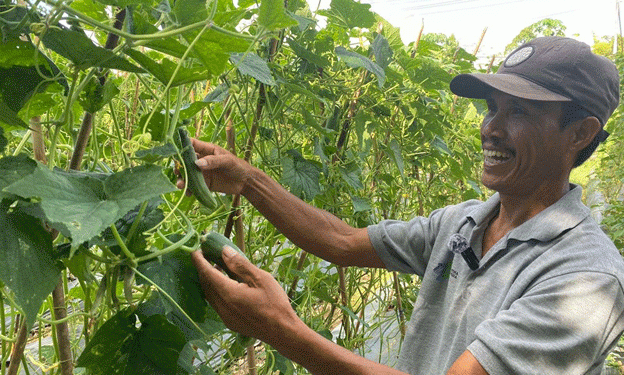As the rainy season blankets the Sanggau Regency in Indonesia, farmers are seizing the opportunity to grow cucumbers (Cucumis sativus), a crop that thrives in wet conditions. Farmers in Sekayam, particularly in Engkahan Village, have reported remarkable success in their cucumber harvests, attributing the crop’s growth to the abundant rainfall.
Antonius, a local farmer, shared, “Cucumbers are ideally planted during the rainy season because the fruits grow larger.” This sentiment reflects a broader trend in agricultural practices where seasonal weather patterns are embraced for optimal crop production.
Benefits of Cucumber Farming in Rainy Season
- Enhanced Growth Conditions: The consistent rainfall provides essential moisture, promoting vigorous growth. Studies show that cucumbers grown in optimal conditions can yield significantly higher quantities, often exceeding 10 tons per hectare . Antonius’s experience with his 7×20 meter plot yielding approximately 400 kilograms in just two months illustrates the potential for high productivity during this season.
- Market Demand and Profitability: The market for cucumbers remains strong, with prices fluctuating between Rp6,000 and Rp13,000 per kilogram. The high demand for cucumbers in local markets, such as Pasar Entikong and Pasar Balai Karangan, allows farmers to secure a reliable income stream despite market volatility. According to the Indonesian Vegetable Association, cucumbers are among the most sought-after vegetables, contributing significantly to rural economies .
- Sustainable Practices: Farmers in the Sekayam region are also integrating sustainable practices into their cucumber cultivation. Crop rotation, efficient water management, and organic farming techniques are being increasingly adopted. These methods not only enhance soil health but also reduce dependence on chemical fertilizers and pesticides .
Challenges Faced by Farmers
Despite the benefits, cucumber farming in rainy conditions is not without its challenges. Farmers must contend with increased humidity, which can lead to diseases such as powdery mildew and downy mildew. Implementing preventative measures, such as crop rotation and selecting disease-resistant varieties, is crucial in mitigating these risks .
Furthermore, fluctuating market prices can create uncertainty for farmers. While the demand is high, price volatility can impact profitability, necessitating strategic marketing and sales approaches to ensure farmers can navigate these fluctuations successfully.
The rainy season presents a valuable opportunity for cucumber farmers in Sanggau, enabling them to produce high-quality crops that meet local demand. By leveraging the favorable growing conditions and adapting to market dynamics, farmers like Antonius are not only enhancing their income but also contributing to the region’s agricultural sustainability. As climate patterns continue to evolve, such resilient farming practices will be essential for ensuring food security and economic stability in rural communities.












